By Justin Swanson | LB Indy
Laguna resident Holly Morrell was going under the knife again, the sixth procedure in nearly a decade.
A defibrillator planted in her chest required repair. Two wires, or “leads,” were fractured, meant to connect to veins near her heart that monitor rhythm and correct dangerous flutters. Another lead was under factory recall. The procedure was delicate and considered high risk, but with the rising number of implanted devices, extraction or lead removal is required more frequently, according to the American Heart Association.
For those with heart implants, a defibrillator malfunction is an even worse fear than facing surgery.
Even so, Morrell took her time, allowing six weeks to prepare herself, to go about her life as an advocate for screening of heart conditions, a silent killer that endangers lives of an unsuspecting population. Her own tragic history led to her professional calling.
Early in Morrell’s life, misfortune befell her family. Relatives were dying of mysterious, patternless illnesses. Her paternal grandmother and a cousin both died when Morrell was 8. After the whole family was tested, in nine of 11 family members doctors detected hypertrophic cardiomyopathy, a thickening of the heart muscle, constricting blood flow and making it harder for the organ to pump blood. The condition is symptomless until cardiac arrest. Six more Morrell family members died at young ages, including three of Morrell’s siblings. Three others survive by interventions such as transplants and defibrillators.
Morrell, herself, was always on the cusp. She too was diagnosed with the condition in 2002, when a defibrillator was implanted in her chest.
Last June, though, Morrell, 46, began searching around the country for a specialist to execute the procedure to update her defibrillator. Burbank’s Dr. Raymond Schaerf, who specializes in cardiovascular disease, was the only thoracic surgeon among them. Morrell was concerned about the worst-case scenario: what was protocol should something go wrong? Schaerf told her it would take minutes to call in a surgeon. As a surgeon himself, Schaerf would be at the ready to work without needing to call for assistance. Morrell was sold.
“I have performed more than 3,000 lead extractions,” Schaerf said. “I would have an early idea of how things are going and therefore how to fix a problem before it arises.”
Leading up to the day of the procedure, Morrell kept to her work. It comforted her; it gave her purpose.

Affected by a Fountain Valley high school football player dying in 1999 from cardiac arrest caused by the same disease that wreaked death in her family, Morrell began screening people for undetected heart conditions. Around the time of her own diagnosis, Morrell founded the nonprofit Heartfelt Cardiac Projects, based in Laguna Beach. The nonprofit provides affordable, 20-minute heart screenings, particularly for young athletes, such as one scheduled Saturday, Feb. 23 from 10 a.m. to 2 p.m. at Five Seasons Healthcare, in Dana Point’s Monarch Bay shopping center. (Pre-register at www.heartfeltcardiacprojects.org.)
While she usually takes part in all of the foundation’s screenings, this weekend Morrell will be speaking about National Heart Month at an event in San Francisco.
Up to 10 percent of those the foundation screens are later recommended to pursue a follow-up with a doctor. And in two percent of that group are detected potentially serious or life threatening conditions that can be treated.
“It’s a twisted blessing,” she said. “I can set a positive example, show people they can live normal, happy lives with it and change the face of disease. We’re choosing to be as positive as we can be, which isn’t always easy.”
By the time of her procedure, Morrell was ready. She had taken time to find a doctor she was comfortable with and she kept busy providing screenings.
Preparation saved her life. As Dr. Schaerf was removing one lead, another lead coiled up on itself, rupturing a vein. Morrell’s blood pressure dropped dramatically. Immediately, Dr. Schaerf could tell her chest cavity was filling with blood. He made a split second decision to open her chest, unplanned, emergency open-heart surgery, and sutured the vein. Morrell was 90 seconds from death.
When she awoke, Morrell found Schaerf kissing her forehead.
“I’m glad you are here,” he said, explaining that the worst-case scenario indeed had arisen and the surgical backup they had talked about possibly needing was put into action.
Only now, months later, is Morrell experiencing any “quality of life.” She is still undergoing physical therapy, but the lifelong tennis player has been directed to cease play, not on account of her heart, but because of the machinery inside her, so delicate after the latest procedure.




